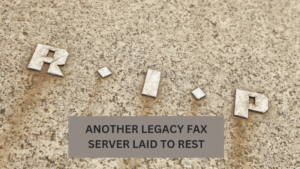If you work in an office, chances are that email is a pillar of your day. Email helps people to communicate and collaborate together in the workplace in a way that is supposedly secure. But how safe and effective is email at handling the tasks that it's used for? If recent headlines are to be believed, then email should be avoided like the plague.
Recent security and phishing breaches experienced by high-profile targets can either be linked back to email or involve the concept being compromised in some way. Whether the encryptions put in place are lacking in strength or human error attaches unintended parties to a sensitive message, email has proven time and again to be a serious let down in the world of enterprise.
One way that organizations are dealing with this issue is through the adoption of FoIP, or fax over IP. By taking the still-relevant concept behind faxing and enabling it to occur on computers and smartphones rather than legacy hardware, businesses of all kinds can enjoy internet security without worrying about data loss occurring.
Here are some of the biggest email-related breaches to occur recently:
1) U.S. State Department, White House email compromised
Of all the industries that deals in private information, the government should have the biggest concerns of all. But according to Naked Security contributor Lisa Vaas, recent attacks on unclassified State Department and White House networks left many wondering if the protections it has in place are all that they can be.
It is safe to say that many of the emails that may have been exposed contained attachments. It's possible that a great deal of them should have been sent over more secure networks, but they were not – be it due to constraints on time and/or convenience. One way in which to ensure sensitive documents are only transmitted through trusted channels is to implement FoIP or cloud-based fax into daily operations. Providing users with a secure, effective solution helps to ensure things only travel in acceptable ways.
2) USPS breach possibly reveals customer, employee information
Another government-sponsored entity – the post office – is probably thankful for every negative bit of email-related news. That is, of course, unless it has to do with the USPS itself. According to Reuters, a recent instance of cybercrime has left more than 800,000 USPS employees and an undisclosed number of customers potentially victimized.
While more than email addresses were stolen, it's all part of the same puzzle. Armed with email addresses that are connected to other personal details, cybercriminals may be able to make easy attempts at breaking passwords and stealing even more information from employees and customers of the USPS. A great example of how this can be a problem comes in the form of shipping history. If a hacker has a person's email address and is able to identify a company that they recently made a purchase from, it's not unreasonable to think that said hacker could masquerade as that organization and contact their target with that information in hand. All it takes is a "click here for more information"-style link that starts a malware download and suddenly these breaches become much more terrifying in scope.
One channel that doesn't have problems of this nature is online faxing. FoIP is much more secure and easily defended. Additionally, fax related scams are much harder to pull off in the present day – having an extra moment to think instead of immediately clicking a link can allow potential victims to identify a potential crime in progress.
3) Home Depot loses astronomical number of customer emails
The USPS breach may seem enormous in size, but it's nothing compared to the instance that's recently plagued Home Depot. Reuters reported that about 53 million personal email addresses belonging to customers were lost after payment data systems were compromised.
This has similar implications to the USPS incident. Having someone's email address might seem to some just like having their phone number. They can call you up, but so what? If anything it's just an annoyance. But the email addresses lost by Home Depot were stolen from the same infrastructure that houses numbers for payment cards – which were also leaked in the attack. All a phishing attack needs to obtain even more information is corroborating details – like the name of the bank a target keeps their money in – to create convincing and dangerous traps.
All of these events carry a common theme – email use needs to be cut down on in the enterprise. Regardless of what field a company is classified by, every organization has to have a secure means of transmitting information.
Enhance enterprise communication, collaboration and compliance efforts with a proven internet faxing & FoIP solution from FaxCore. Contact FaxCore today to learn more about their 'Partly-Cloudy' fax solutions.




